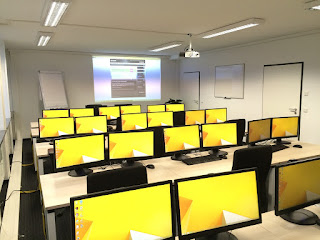Understanding the environments in which schools operate (part 5): The evolving technological environment
Before I explain why managers of schools should seek to constantly develop their understanding of the technological environment, I will outline what I mean by the technological environment.
The technological environment refers to a space that is defined by the technologies that proliferate there. Technologies, here, refer to the tools/methods that societies are now using to manipulate nature and each other for gain.
In this light, the technological environment of the school referred to here, means the tools/methods which are available in the space in which schools operate and to which the schools have access and which can help those in the school community – managers, administrators, teaching staff and students – to increase their productivity, create knowledge and substantially enhance communication and the work of the school.
The technological environment is dynamic. If we travel vicariously through history we will pass through stages of civilisation where different technologies predominate. For example, we will see the use of stone, copper and bronze, iron, agricultural and industrial technologies, information and communications technologies (ICT) among others. Today’s civilisation is in the era where ICTs predominate.
The ICTs which are available today to the managers of schools include, but are not limited to, traditional telephones, smart phones and other cellular phones and, in the midst of all these ICTs, there is the computer which has made possible a wide range of modes of communication along with its other uses. Proponents of the use of ICTs believe that these technologies have a number of benefits for the users. For example, the “experts” believe that the use of ICTs by countries will significantly increase their productivity. In their latest ranking of countries according to their technology readiness, that is, countries embracing the use of Information Technology, the Global Information Technology Report (GITR, 2013) ranks Jamaica eighty fifth out of one hundred and forty four countries. Countries’ rankings are based “on their capacity to exploit the opportunities offered by the digital age” and also “on a broad range of indicators from Internet access and adult literacy to mobile phone subscriptions” among other indicators.
This report has claimed that the use of digital technology, for example, is positively linked to economic growth, and has the potential to drastically reduce poverty among other touted benefits. Thus, the lag of Jamaica and countries in much of the developing world in embracing technology is seen as negatively impacting these countries’ development. (http://www.weforum.org/reports/global-information-technology-report-2013).
To an extent, Jamaica’s lag in fully embracing the use of ICTs is as a result of the timidity of many adults in positions of influence in society to fully engage themselves with these technologies.
For example, there are quite a number of managers of schools who have not learnt to use the computer and are not in any hurry to do so. If they do not use the computer, they do not have access to the internet and to useful resources that are at their finger tips to enhance their perspectives on the job. According to the Internet World Stats Report as of December 2011 (the last time it has updated its figures for Jamaica) just over 55% of Jamaicans use the internet, (http://www.internetworldstats.com/stats11.html). This figure should be a bit higher after two years. But unfortunately, in that over forty percent of Jamaicans who do not use the internet may be found a number of managers of schools.
Many of these managers have smart phones. Without searching for the statistics I can confidently say that more than 90% of school managers have access to these phones. The Blackberry is ubiquitous among them. Unfortunately, not many of these managers of schools use them except to make and receive calls.
Furthermore, some schools have been given technology to enhance learning such as interactive whiteboards. However, these boards are securely locked away, as one teacher says; probably for fear that teachers and students will damage them by using them. This practice by managers of preventing staff from using the technology that organisations donate to schools runs counter to the intentions of the organisations which donate the technology. And, students and teachers lose out on the use of this technology that could enhance teaching and learning in the school.
Managers of schools need to realise that the use of technology is changing the environment of the school as they once knew it. Many students and some teachers are quite technologically literate. These students and teachers have realised that the ICTs are useful in allowing them to efficiently store, retrieve, transmit and manipulate data along with enhancing communication. And because of the benefits to be derived from using these technologies, they are not afraid to make use of them.
This is not to say that some managers of schools do not make use of the available ICTs. There are a number of forward thinking managers of schools who are, indeed, into the use of ICTs in their schools to speed up communication and to save on resources such as paper. But, there are some teachers who are not willing to fall in line. A number of teachers in one school are annoyed with their school manager for constantly communicating with them via text messages, emails or with the use of the telephone. They believe in the traditional technology of communicating to staff, that is, via notices on paper posted on the notice board or through meetings. These teachers believe that the style of communication that the manger has adopted is just too impersonal.
Of course, many of these teachers who are complaining are the ones who have not yet come to terms with the many possibilities that abound with the use of ICTs.
Managers of schools need to lead their staff. In this environment where a number of ICTs are proliferating, ICTs that can enhance teaching and learning, speed up communication, improve the responsiveness of the schools to the demands of their stakeholders, improve transparency and accountability as well as productivity, managers of schools should try to harness them to benefit their schools. In order to do this, though, they need to organise workshops to educate their staff and themselves about the technologies that are available to them and their use and ensure that they all make use of them as they carry out the various tasks that they are assigned in their schools.Read the other parts of this article at the following links:
Part 1
Part 2
Part 3
Part 4
Part 6




Comments
Post a Comment